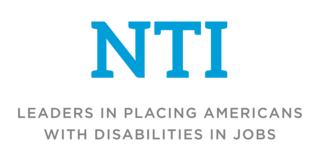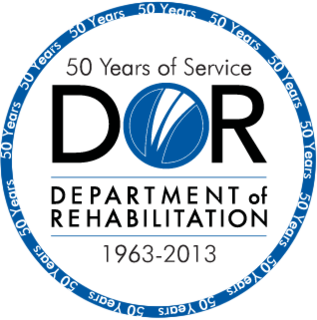Related Research Articles

The Texas Department of Assistive and Rehabilitative Services (DARS) was a Texas state agency that was part of the Texas Health and Human Services Commission. The agency worked with Texans with disabilities and children with developmental delays to improve the quality of their lives and to enable their full participation in society.
The Workforce Investment Act of 1998 was a United States federal law that was repealed and replaced by the 2014 Workforce Innovation and Opportunity Act.

The Veterans Benefits Administration (VBA) is an agency of the U.S. Department of Veterans Affairs. It is responsible for administering the department's programs that provide financial and other forms of assistance to veterans, their dependents, and survivors. Major benefits include Veterans' compensation, Veterans' pension, survivors' benefits, rehabilitation and employment assistance, education assistance, home loan guaranties, and life insurance coverage.

The Rehabilitation Act of 1973,, is a federal law, codified as 29 U.S.C. § 701 et seq. The principal sponsor of the bill was Rep. John Brademas [IN-3]. The Rehabilitation Act of 1973 replaces preexisting laws to extend and revise the authorization of grants to States for vocational rehabilitation services, with special emphasis on services to those with the most severe disabilities, to expand special Federal responsibilities and research and training programs with respect to individuals with disabilities, to establish special responsibilities in the Secretary of Health, Education, and Welfare for coordination of all programs with respect to individuals with disabilities within the Department of Health, Education, and Welfare, and for other purposes.

Rehabilitation counseling is focused on helping people who have disabilities achieve their personal, career, and independent living goals through a counseling process.
A mental health professional is a health care practitioner or social and human services provider who offers services for the purpose of improving an individual's mental health or to treat mental disorders. This broad category was developed as a name for community personnel who worked in the new community mental health agencies begun in the 1970s to assist individuals moving from state hospitals, to prevent admissions, and to provide support in homes, jobs, education, and community. These individuals were the forefront brigade to develop the community programs, which today may be referred to by names such as supported housing, psychiatric rehabilitation, supported or transitional employment, sheltered workshops, supported education, daily living skills, affirmative industries, dual diagnosis treatment, individual and family psychoeducation, adult day care, foster care, family services and mental health counseling.
The Rehabilitation Services Administration (RSA) is a federal agency under the United States Department of Education, Office of Special Education and Rehabilitative Services, and is headquartered within the Department of Education in Washington, D.C. It was established to administer portions of the Rehabilitation Act of 1973. Its mission is to provide leadership and resources to assist state and other agencies in providing vocational rehabilitation (VR) and other services to individuals with disabilities to maximize their employment, independence and integration into the community and the competitive labor market.
The United States Social Security Administration's Ticket to Work and Self-Sufficiency Program is the centerpiece of the Ticket to Work and Work Incentives Improvement Act of 1999.
Supported employment refers to service provisions wherein people with disabilities, including intellectual disabilities, mental health, and traumatic brain injury, among others, are assisted with obtaining and maintaining employment. Supported employment is considered to be one form of employment in which wages are expected, together with benefits from an employer in a competitive workplace, though some versions refer to disability agency paid employment. Companies such as Skilcraft in the United States are an example of "supported employment" which is defined in law for state and federal reimbursements.
The Kessler Foundation was established in 1985 and is one of the largest public charities in the United States supporting people with disabilities. Kessler Foundation Research Center has research programs designed to improve function and quality of life for persons with spinal cord and traumatic brain injury, stroke, multiple sclerosis and other neurological and orthopedic conditions. Kessler Foundation has also distributed millions of dollars to programs that promote the employment of people with disabilities through its "Transition to Work" Signature and Community Employment grants. The Foundation's Special Initiative grants also support related community programs like ThinkFirst, an injury prevention program for children. Kessler Foundation has a full-time staff of 90 individuals, divided between two locations in West Orange, NJ.

Richard Keith Pimentel is an American disability rights advocate, trainer, and speaker who was a strong advocate for the passage of the Americans with Disabilities Act. He developed training materials aimed to help employers integrate persons with disabilities into the workplace.

National Telecommuting Institute, Inc. (NTI) is a 501(c)(3) non-profit organization. NTI is headquartered in Boston.

The Oklahoma Department of Rehabilitation Services (DRS) is an agency of the government of Oklahoma responsible for providing people with physical, mental and visual disabilities with the opportunity to obtain employment and independent living through counseling, job training and other individualized services. DRS helps bridge barriers to success in the workplace, school and at home. DRS has five program divisions, Vocational Rehabilitation, Visual Services, Disability Determination, Oklahoma School for the Blind and Oklahoma School for the Deaf. These divisions operate dozens of specialized programs that help Oklahomans lead more independent and productive lives.

The Texas Workforce Commission (TWC) is a governmental agency in the U.S. state of Texas that provides unemployment benefits and services related to employment to eligible individuals and businesses.
National Disability Employment Awareness Month was declared in 1988 by the United States Congress for the month of October to raise awareness of the employment needs and contributions of individuals with all types of disabilities. The month is an extension of "National Employ the Physically Handicapped Week" originally observed during the first week of October beginning in 1945. In 1962 the word "physically" was removed from that week to acknowledge the employment needs and contributions of individuals with all types of disabilities. Americans observe National Disability Employment Awareness Month by paying tribute to the accomplishments of the men and women with disabilities whose work helps keep the nation's economy strong and by reaffirming their commitment to ensure equal opportunity for all citizens.

Vocational rehabilitation, also abbreviated VR or voc rehab, is a process which enables persons with functional, psychological, developmental, cognitive, and emotional disabilities, impairments or health disabilities to overcome barriers to accessing, maintaining, or returning to employment or other useful occupation.
Lexington School and Center for the Deaf comprises the Lexington School for the Deaf, the Lexington Hearing and Speech Center, Lexington Vocational Services, and the Lexington Center for Mental Health in New York City, aimed at serving the deaf and hard of hearing community.

The California Department of Rehabilitation (DOR) is a California state department which administers vocational rehabilitation services. It provides vocational rehabilitation services and advocacy from over 100 locations throughout California seeking employment, independence, and equality for individuals with disabilities. The DOR was established on October 1, 1963.

Worldwide, there are between 180 and 220 million youth with disabilities. Eighty percent of disabled youth live in developing countries, and therefore have even less access to education, health care, jobs and general rights Disabilities include physical, mental disabilities or mental illness. Many youth live normal and stable lives, however those with disabilities may experience more obstacles than those without due to potential limitations, those created by physical limitations and social limitations.
Rehabilitation Psychology is a specialty area of psychology aimed at maximizing the independence, functional status, health, and social participation of individuals with disabilities and chronic health conditions overall and specifically with gaining and advancing with employment. Assessment and treatment may include the following areas: psychosocial, cognitive, behavioral, and functional status, self-esteem, coping skills, and quality of life. As the conditions experienced by patients vary widely, rehabilitation psychologists offer individualized treatment approaches. The discipline takes a holistic approach, considering individuals within their broader social context and assessing environmental and demographic factors that may enhance or impede progress.
References
- ↑ Heisey, Amanda. "Companies give back by hiring". Business Observer. Retrieved 1 April 2013.
- ↑ Pounds, Marcia Heroux (November 18, 2009). "Disability adds to the burdens of joblessness". Sun-Sentinel (Florida). p. BM6. Retrieved 2009-11-18.
- ↑ Bradfield, Robert (November 2, 2009). "Stimulus Money Gives Local Man A Job". WCJB-TV 20 Gainesville. Retrieved 2009-12-17.